Blog>Expert Advice>Best kitchen flooring: Your complete buying guide
Last updated: 25 November 2024
Best kitchen flooring: Your complete buying guide
This buying guide will help you weigh up the best kitchen flooring for your home, taking into account the pros and cons, suitability, and cost of the most popular options.
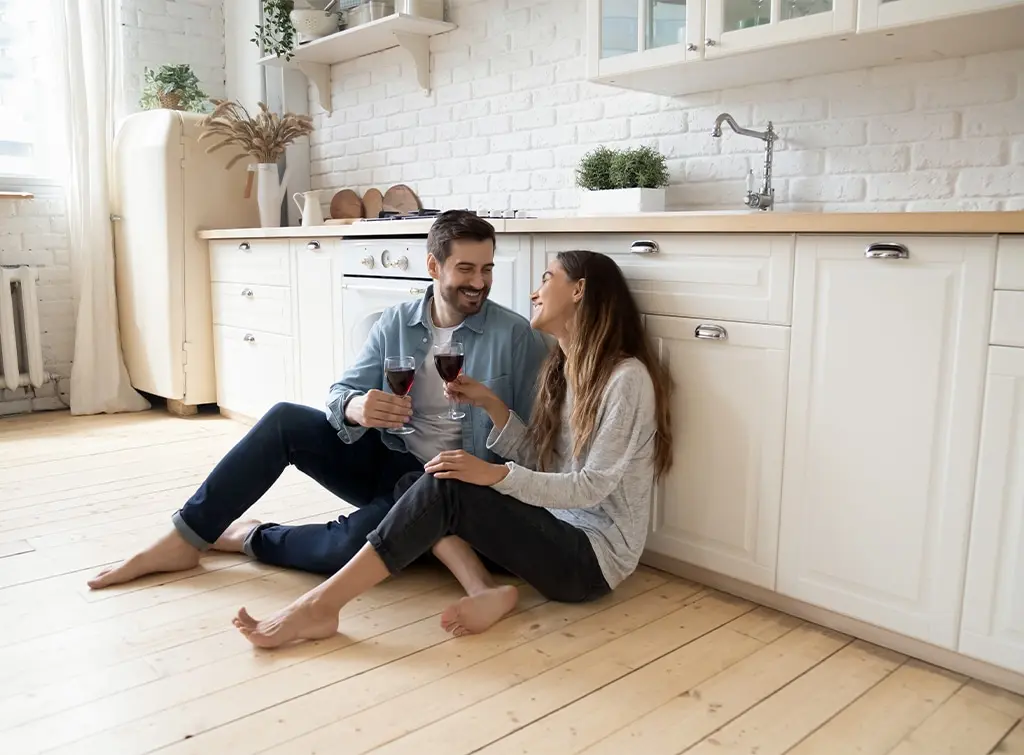
The kitchen is one of the busiest rooms in your home, therefore selecting the best kitchen flooring is as much about function as it is style.
Here, you'll discover how to choose the most suitable kitchen flooring based on your household and your needs, your style preferences, and of course, your budget!
Factors to consider when selecting your kitchen flooring
The key considerations to bear in mind when choosing the best kitchen flooring for your home include:
1. Style and aesthetic
The right choice of flooring can help to elevate your overall kitchen decor. Make sure to choose a style that complements your cabinets, worktops, and overall 'look'.
In a farmhouse kitchen, flagstone tiles would be the icing on the cake. However, a more contemporary kitchen could look great with a polished concrete floor.
If you have an open-plan kitchen, consider whether your flooring will run throughout your home, and hence what textures, colours, and patterns would work well.
2. Durability and maintenance
The kitchen is a high-traffic area, used for cooking, socialising, and family gatherings, therefore durability is key.
In a busy household, you may need to consider the most suitable flooring for muddy footprints (and pawprints!) traipsing through the kitchen.
And on that note, think about what level of maintenance and care you're happy to commit to. Some types of flooring are extremely easy to clean, whereas others need more care to keep them looking their best.
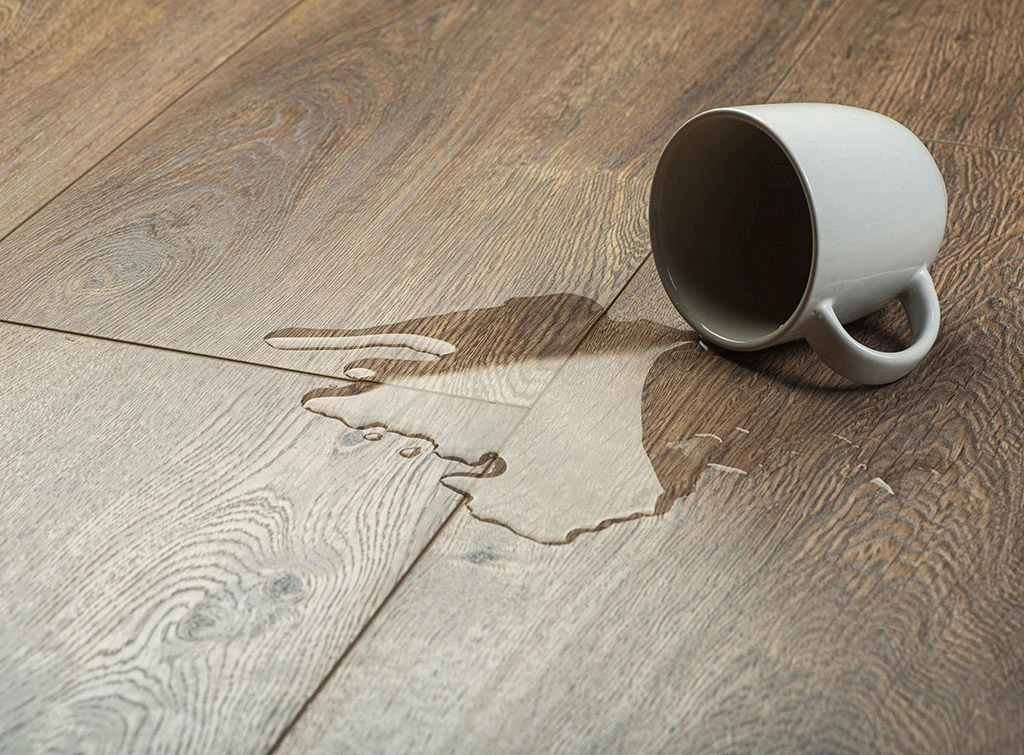
3. Water resistance and safety
Spills and splashes are inevitable in a kitchen, therefore water resistance should be a top priority with your choice of flooring.
By choosing a water-resistant flooring option, you'll reduce the risk of moisture damage, which could lead to warping, stains, or mould. Essentially, choosing a suitable flooring will help it to last longer.
Safety is another consideration, especially in homes with children or elderly family members. Opt for more slip-resistant surfaces in this case.
4. Cost and budget
There's a huge range in costs when it comes to flooring, from affordable to luxury, depending on the material and quality you choose.
Many people love the budget-friendly options of vinyl and laminate to achieve the effect of wood or tile flooring for a fraction of the price of the real thing.
In addition to the cost of materials, don't forget to budget for the cost of installation plus any extras, such as door adjustments and floor levelling, etc.
See the tradespeople we've checked and recommend for your job
Popular types of kitchen flooring in the UK
To help you choose the best kitchen flooring for your home, we've outlined the pros, cons, suitability, and cost of some of the most popular options.
Vinyl flooring for kitchens
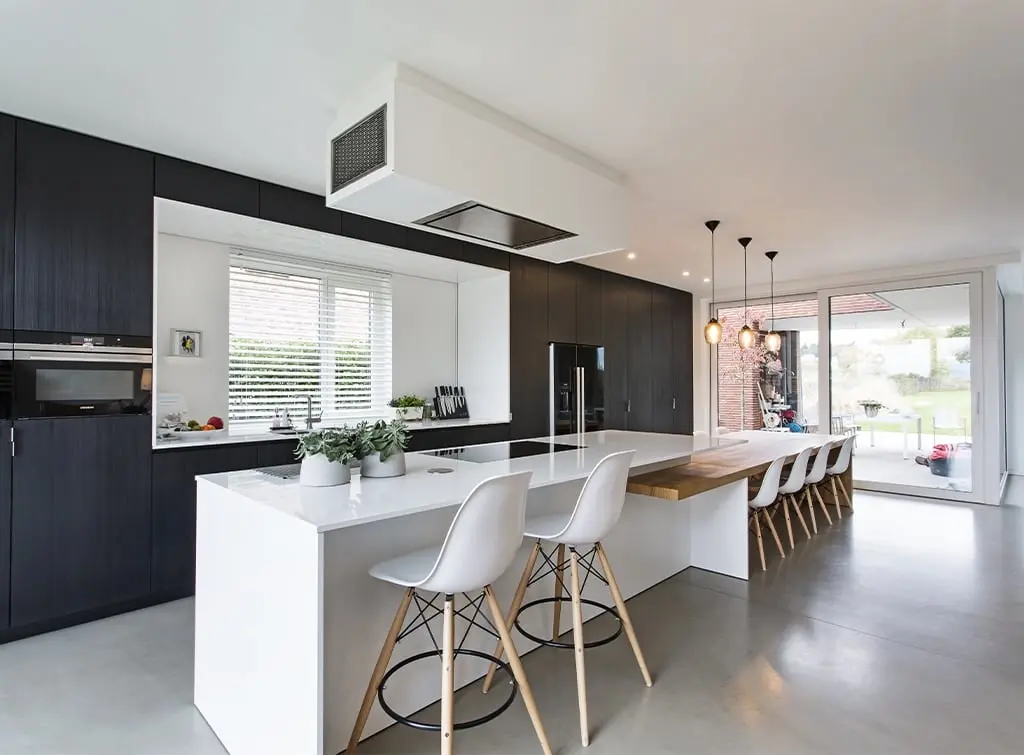
Pros: Affordable, stain-resistant, waterproof, and comfortable underfoot. Available in a huge range of colours, patterns, and styles (to mimic stone, tiles, or wood)
Cons: Can dent or scratch over time and typically has a shorter lifespan than other flooring options. Recycling is not normally an option. However, higher-quality vinyl offers better longevity and durability
Maintenance: Easy to wipe clean and maintain with a damp cloth or mop. Avoid abrasive cleaning tools that could damage the surface of the vinyl
Suitability: Being waterproof and easy to clean makes it ideal for family kitchens with children or pets
Cost: Luxury Vinyl Tile (LVT) typically costs between £20 - £50 per m² depending on the quality
Laminate kitchen flooring
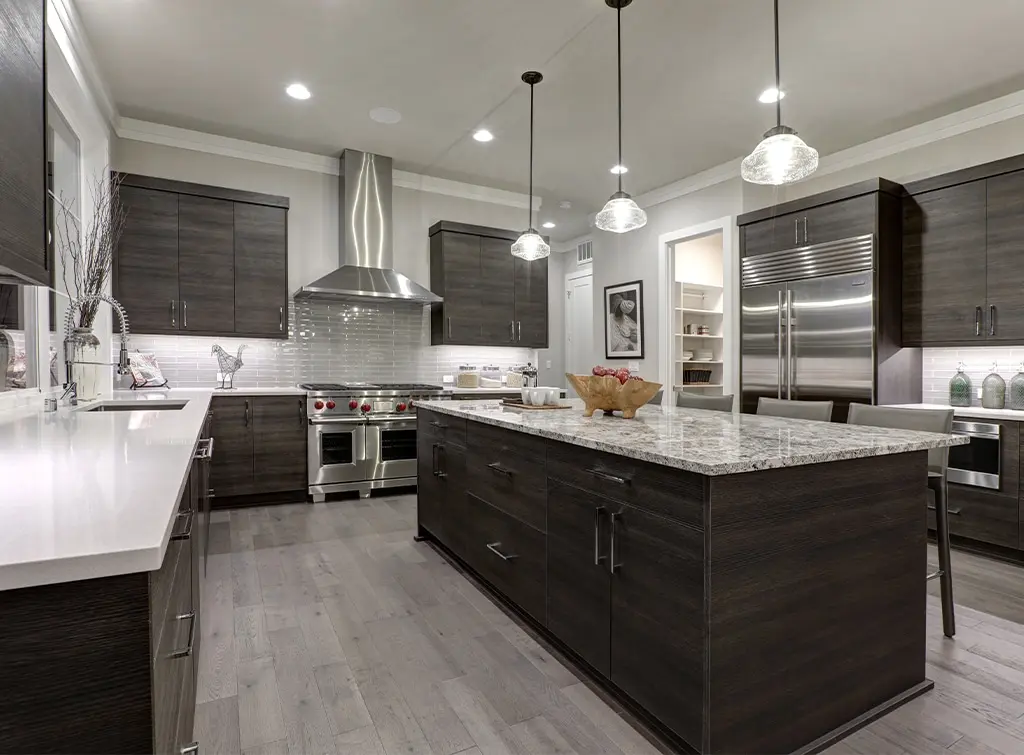
Pros: Inexpensive, easy to install, and scratch-resistant. Available in a wide selection of styles - popular with those who want the realistic look of wood or tile but without the expensive price tag
Cons: Less water-resistant than vinyl - can swell if exposed to water over time
Maintenance: Clean with a damp mop (not wet). Ensure any spillages are cleaned up quickly to avoid moisture damage. Use specialist laminate cleaner to protect the finish
Suitability: Ideal for open-plan kitchens that flow into other rooms due to the wide range of realistic wood and stone effect styles available
Cost: Laminate flooring tends to cost in the region of £20 - £60 per m²
Struggling to choose between vinyl and laminate flooring?
Check out our handy comparison guide.
Engineered wood kitchen flooring
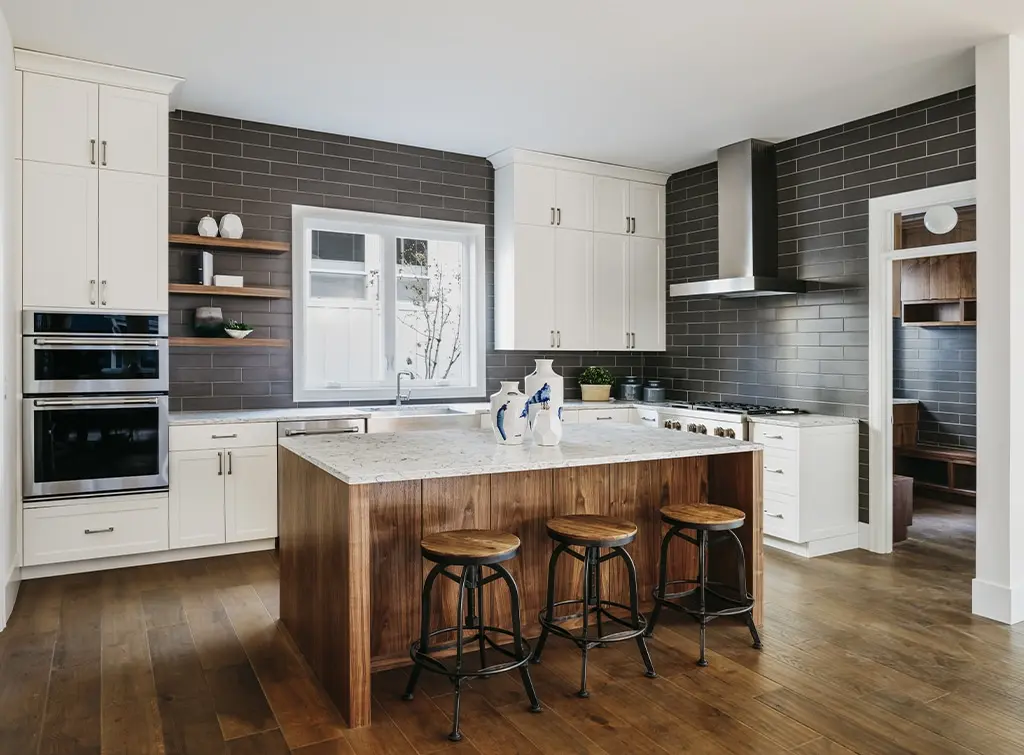
Pros: Has a stylish, more realistic appearance than laminate. Long lasting and solid underfoot
Cons: Has limited water-resistance and can fade over time. Susceptible to dents and scratches
Maintenance: Sweep regularly and use a damp mop (not wet) and wood-safe cleaners. Sealant is often recommended for added protection
Suitability: Perfect for those looking for a realistic wood finish, that might cost a little more than laminate, but will last longer
Cost: Engineered wood flooring costs around £30 - £75 per m²
Hardwood flooring is more expensive than engineered wood, at between £30 - £80+ per m². Our guide to wood flooring has more information.
Tile kitchen flooring
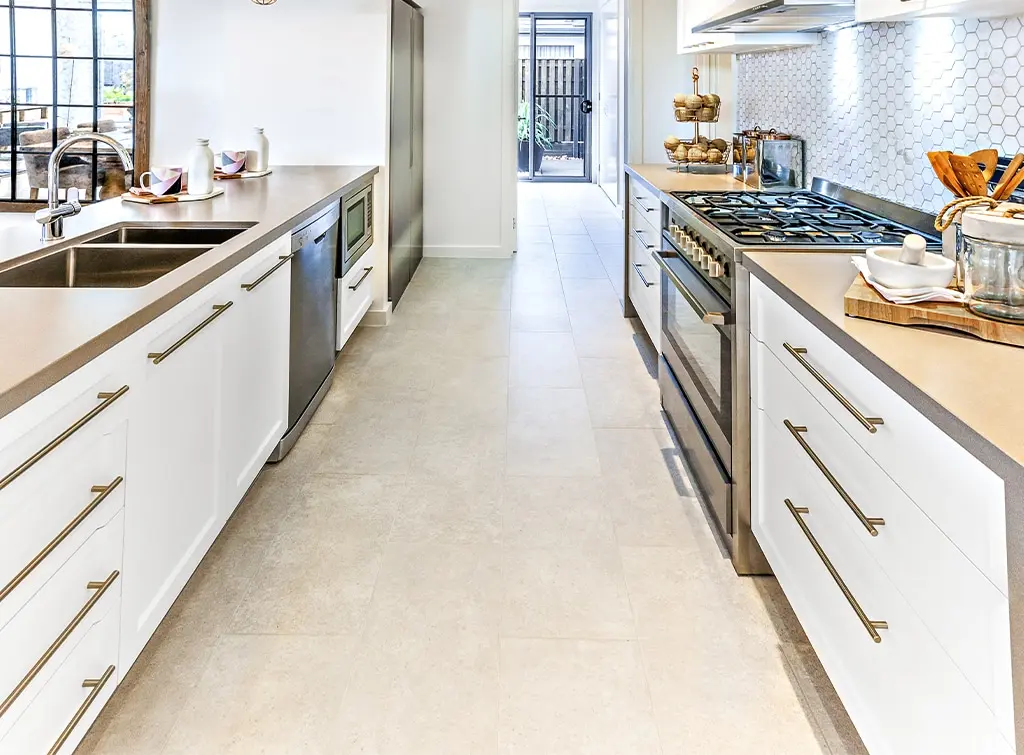
Pros: Highly durable and waterproof, easy to maintain, timeless appearance, available in countless colours and patterns. Can add value to your home
Cons: Can feel cold and hard underfoot, is typically more expensive, grout may need periodic cleaning to stay looking fresh
Maintenance: Regularly sweep and mop with a mild detergent. Grout may need resealing occasionally to prevent staining
Suitability: Well suited to busy households that need a durable, hard-wearing flooring option in the kitchen
Cost: Ceramic and porcelain are often cheaper than slate or limestone. Prices range from £10 - £40 per m² for standard tiles up to £50 - £100 per m² or more for premium materials
Concrete kitchen flooring
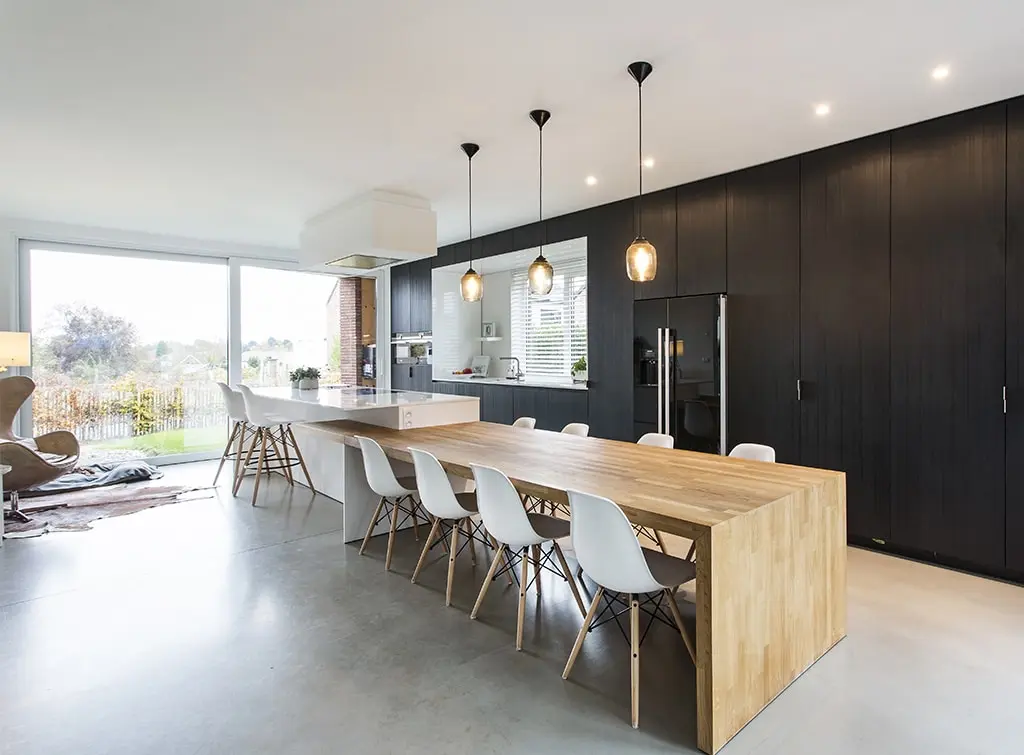
Pros: One of the most durable types of flooring. Has a modern, industrial look. Sustainable. Can be polished or stained
Cons: Can be expensive. May need periodic sealing to maintain its appearance. Hard underfoot
Maintenance: Clean with a pH-neutral cleaner and reseal annually for stain resistance
Suitability: Modern kitchens with high demands and ample floor space
Cost: Polished concrete flooring typically costs between £120 - £150 per m²
See the tradespeople we've checked and recommend for your job
Comparing the cost of kitchen flooring options
For most people, cost is a determining factor when choosing flooring for their home.
The cost of kitchen flooring boils down to three elements: materials, installation, and additional costs.
Materials
Here's a handy summary of material costs per m²:
Luxury Vinyl Tile (LVT): £20 - £50 per m²
Laminate flooring: £20 - £60 per m²
Engineered wood flooring: £30 - £75 per m²
Hardwood flooring: £30 - £80+ per m²
Tile: Between £10 - £40 per m² for standard tiles up to £50 - £100 per m² + for premium materials
Polished concrete flooring (labour included): £120 - £150 per m²
Labour
The cost of installing your kitchen floor will vary depending on the type of flooring and the complexity of the job.
Tile and concrete are likely to cost more due to the extra work involved. As a guide, use these figures to help budget for the cost of installation:
Luxury Vinyl Tile (LVT): £45 per m²
Laminate flooring: £25 per m²
Engineered wood flooring: £15 - £60 per m²
Hardwood flooring: £35 - £60 per m²
Tile: £35per m²
Polished concrete flooring (materials and labour): From £1,950 (40m²)
Additional costs
When requesting a quote for your kitchen floor installation, ask for any additional costs to be itemised. For example:
Removing old flooring
Levelling the floor
Underlay
Adhesive materials
Adjusting doors
Removing and replacing skirting
Waste disposal
This way, you can easily compare quotes like-for-like and be sure you're receiving a fair and competitive price for the job.
Request a quote for your flooring project
Use our request a quote form to get a selection of quotes from approved floor fitters in your area.
Contact or pay a trade through Checkatrade and you’re covered by our 12-month guarantee of up to £1,000*

DIY vs. professional installation
Some types of flooring are often tackled as a DIY project. This is a good way of saving money on installation.
However, for such an integral part of your home, we'd only recommend doing so if you feel confident in your DIY skills and have the necessary tools and equipment available.
Making mistakes can lead to warping, uneven surfaces, and ultimately, a reduced lifespan.
For a top-quality, efficient, long-lasting job, we always recommend using a specialist floor fitter.
Do you need help with the rest of your kitchen decor?
At Checkatrade, we help to connect homeowners with quality tradespeople across the UK.
If you're in search of the best kitchen flooring as part of a wider kitchen renovation, we can help you find the trades you need.
Enter your postcode below to see who comes highly rated in your area.
See the tradespeople we've checked and recommend for your job
Key takeaways
You've worked your way through the pros and cons of different kitchen flooring types earlier in this guide
We've looked at the best flooring options for a kitchen based on durability and style preferences
We've also been able to identify some of the more affordable kitchen flooring ideas for UK homes
In summary, tile is incredibly durable and has a classic appearance, but it can be expensive
Good quality vinyl is another durable option, popular in busy households that need an easy-to-clean material
However, many homeowners wishing to mimic the look of wood or tile for less choose laminate, or to get even closer to the real thing, engineered wood
For those with more budget and ample floor space, polished concrete is an attractive choice.
All flooring materials range in price, from cheaper sheet vinyl to higher quality LVT; ceramic and porcelain tile up to limestone and slate. Don't write off one or the other without doing your research to see what's available.
Finally, a note on the importance of waterproof kitchen flooring...
In a moisture-prone space such as a kitchen, it's important that your flooring has water-resistant qualities. After all, water damage could cause your flooring to warp and swell, reducing its lifespan.
Vinyl is a high scorer here, being completely waterproof, as is tile flooring
Other types of flooring, such as laminate and engineered wood, can be used in the kitchen, but spillages must be cleaned up quickly to avoid water damage
Buying guide: Helping you to choose your kitchen lighting
We share plenty of expert advice on kitchen lighting in this ultimate buying guide.
Find flooring specialists near you
Ready to find a flooring expert for your home improvement project? Search your postcode to find experienced and reputable flooring specialists (that we’ve checked and approved) near you.
See the tradespeople we've checked and recommend for your job
FAQs
What is the most durable flooring for a kitchen?
There are several types of kitchen flooring that are considered durable. Vinyl is a great option at one end of the price spectrum and is completely waterproof. Tiles are more expensive but will last for decades.
Is vinyl or laminate better for a kitchen?
Vinyl flooring is better than laminate in rooms prone to moisture or humidity such as a kitchen. However, laminate typically offers a more realistic appearance if you're aiming to mimic the look of wood or tile.
How much does kitchen flooring cost in the UK?
LVT flooring for kitchens ranges from £20 - £50 per m². Tile kitchen flooring can cost in the region of £10 - £40 per m² for standard tiles up to £50 - £100 per m² + for premium materials.
Which kitchen flooring is easiest to clean?
Vinyl is considered to be one of the easiest kitchen flooring materials to keep clean. All it needs is a quick mop or wipe with warm water and a mild detergent.
Can I install kitchen flooring myself or do I need a professional?
It is possible to install some types of kitchen flooring yourself if you have the skills and know-how. However, for a top-quality, efficient, long-lasting job, we always recommend using a specialist floor fitter.
What type of flooring is best for an open-plan kitchen?
For an open-plan kitchen, laminate is a popular choice. It's affordable and versatile, with a wide range of colours and styles making it easy to choose an option that will work well throughout your home.
See the tradespeople we've checked and recommend for your job



